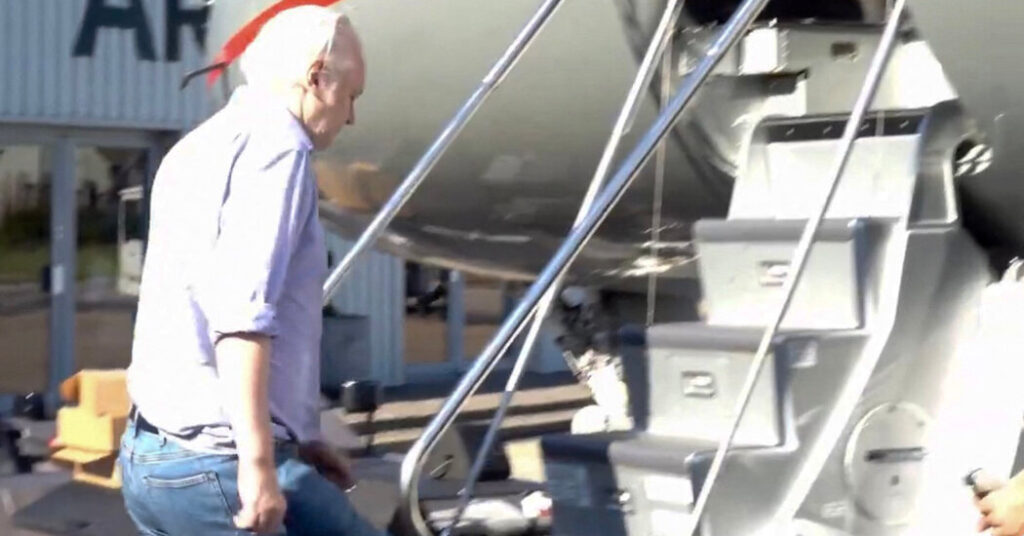WikiLeaks founder Julian Assange agreed on Monday to plead guilty to one felony count of illegally obtaining and disclosing national security material in exchange for his release from a British prison, ending his long and bitter standoff with the United States.
Mr Assange, 52, was granted a request to appear before a court in Saipan, the capital of the Northern Mariana Islands, one of the more remote outposts of the federal judiciary, according to a brief court filing released late in the evening. He is expected to be sentenced to about five years in prison, equivalent to the time he would have served in Britain, according to a law enforcement official familiar with the terms of the agreement.
It was a fitting final twist in the case against Assange, who has stubbornly fought extradition to the U.S. mainland. The islands, a US commonwealth in the middle of the Pacific, are closer to Mr Assange’s home country of Australia, where he is an Australian citizen, than to the US mainland or the courts in Hawaii.
Shortly after the deal was disclosed, WikiLeaks said Assange had left London. Matthew J. McKenzie, an official with the Justice Department’s counterterrorism division, wrote in a statement that Assange is scheduled to appear in Saipan at 9 a.m. local time on Wednesday “after the conclusion of the proceedings.” Will fly back to Australia.
Early Tuesday morning, his wife, Stella Assange, posted a video showing her husband signing documents and boarding a flight on Monday.
Barring last-minute snags, the deal would end a protracted battle that began in the 2010s when Assange was alternately praised and reviled for leaking state secrets.
They include information about U.S. military activities in Iraq and Afghanistan, as well as confidential cables shared between diplomats. During the 2016 campaign, WikiLeaks released thousands of emails stolen from the Democratic National Committee, leading to scandals within the party and the Clinton campaign.
In 2019, a federal grand jury indicted Assange on 18 counts related to WikiLeaks’ dissemination of a large number of national security documents. It includes a trove of material sent to the group by Chelsea Manning, a former U.S. Army intelligence analyst who turned over information on military planning and operations nearly a decade ago.
If convicted, Assange could face up to 170 years in federal prison. Until Monday night, Assange was being held at Belmarsh Prison, one of Britain’s highest-security prisons in southeast London.
According to a report published by The National this year, Assange was locked in a cell for 23 hours a day, eating alone from a tray, surrounded by 232 books, and was only allowed to exercise for one hour a day in the prison yard.
When asked about his pallor, Assange joked, “They call it prison pallor.” For more than a decade, he has been unable to walk out without supervision.
His release was not unexpected. Earlier this year, Australian Prime Minister Anthony Albanese suggested that U.S. prosecutors needed to close the case, and President Biden has said he is open to a quick resolution. Senior Justice Department officials accepted a deal not to increase his sentence because Assange is already serving longer sentences than most people charged with similar crimes – in this case, more than five years in Britain.
Shortly after the charges were revealed in 2019, the Metropolitan Police entered the Ecuadorian embassy, where Assange had sought asylum years earlier to avoid extradition to Sweden, where he faces sexual assault charges. He has been detained since then as his legal team fights the Justice Department’s efforts to extradite him.
After weeks of negotiations, Assange pleaded guilty to one charge in the indictment – conspiracy to disseminate defense information – which carries a maximum penalty of 10 years in prison.
Mr. Assange and his supporters have long argued that his efforts to obtain and publicly release sensitive national security information are in the public interest and deserve the same First Amendment protections afforded to investigative journalists.
Many of Assange’s supporters, while expressing relief at Assange’s release, reiterated these concerns.
“For the first time in the more than 100-year history of the Espionage Act, the United States has criminalized the Espionage Act for basic journalistic conduct,” said David Greene, director of civil liberties at the nonprofit Electronic Frontier Foundation. Highlights First Amendment issues.
“These charges should never have been brought,” he said.
In 2021, a coalition of civil liberties and human rights groups urged the Biden administration to drop efforts to extradite him from the UK and prosecute him, saying the case posed a “serious threat” to press freedom.
The organization said much of the behavior he was accused of was “the everyday behavior of a journalist”. “News organizations routinely and necessary release confidential information in order to inform the public about events of profound public significance.”
But U.S. officials believe Assange’s actions went far beyond news gathering and posed risks to national security. Prosecutors allege that the material provided by Ms. Manning endangered the lives of service members and Iraqis who cooperated with the military and made it more difficult for the country to respond to external threats.
Mr Assange has remained in Belmarsh as he has repeatedly challenged orders to deport him. Last month, Assange won his extradition appeal.
Ms Assange married Mr Assange after she joined his legal team fighting extradition to Sweden.
“The Biden administration should distance itself from this disgraceful prosecution,” Ms Assange said. The couple has two young sons.
Assange rarely appears in public as his case winds its way through the courts, citing health concerns. In 2021, Assange suffered a minor stroke in prison. He did not attend the May hearing due to undisclosed health reasons.
Ms Assange said events were moving very quickly in a separate video posted to social media earlier on Tuesday, which was recorded outside Belmarsh Prison last week.
“I am now confident that this period of our lives is over,” she said. She added, “With Julian free, a new chapter now begins.”

